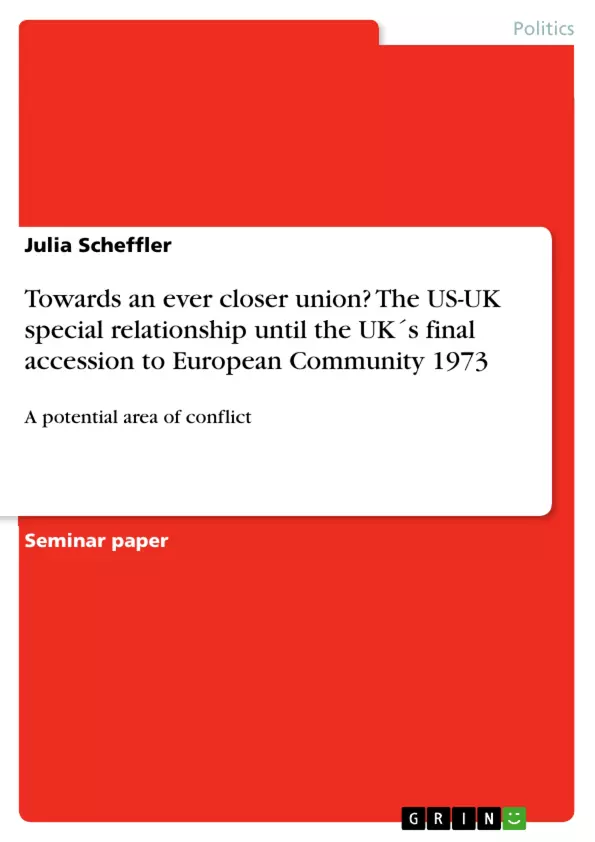This paper is going to examine the connections of the United Kingdom with the European Community (EC) respectively the European Communities in the light of their “close relationship” with the United States of America. It covers the main historical and political developments from 1945 until the accession of United Kingdom to the EC in the year of 1973 and addresses the question why Great Britain only joined that late and what role the closeness to the United States played in this interrelations. An important role will thereby be played also by France, the main opponent of a British accession of the European Community.
Inhaltsverzeichnis (Table of Contents)
- Introduction: The “special relationship” between the UK and the US
- The early developments after the 2nd World War.
- British Foreign Policy after 2nd world war
- From the establishment of the EEC respectively Messina Conference until the first application of UK
- The first application of UK to join the European Communities
- The difficulties to become a Member State: the second and third application of UK to join European Community and the final accession
- List of Abbreviations in Alphabetical Order
- List of References
Zielsetzung und Themenschwerpunkte (Objectives and Key Themes)
This paper examines the UK's connections with the European Community (EC) in the context of its "close relationship" with the United States. It covers key historical and political developments from 1945 to the UK's accession to the EC in 1973. The paper investigates the reasons for the delayed UK entry, specifically exploring the role of the "special relationship" with the US. It also discusses the opposition to British accession by France, particularly the actions of Charles de Gaulle.
- The evolution of the "special relationship" between the US and UK
- The UK's foreign policy objectives in the post-war period
- The impact of the "special relationship" on the UK's relationship with Europe
- The role of France in blocking the UK's early entry to the EC
- The historical factors influencing the UK's eventual accession to the EC
Zusammenfassung der Kapitel (Chapter Summaries)
The introduction defines the "special relationship" and its historical context, emphasizing its importance in Anglo-American relations since World War II. It highlights the close ties in various fields, including military, intelligence, and economics.
The chapter covering the early developments after World War II analyzes the breakdown of the wartime alliance and the emergence of the US as a dominant force in the capitalist world. It explores the British approach to foreign policy, their initial rejection of French proposals for a customs union, and their preference for a close relationship with the US. The chapter also discusses the development of NATO and the attempted creation of a European Defence Community (EDC).
The chapter on the first application of the UK to join the European Communities examines the factors that led to the UK's initial application, including the economic and political landscape of the time. It further explores the challenges and obstacles the UK faced, notably the opposition from France.
Schlüsselwörter (Keywords)
The paper focuses on key concepts such as the "special relationship," British foreign policy, European integration, the European Community (EC), the role of France, Charles de Gaulle, the Cold War, and the historical context of the post-war era.
Frequently Asked Questions
What is the "special relationship" between the UK and the US?
It refers to the exceptionally close political, diplomatic, cultural, and military ties between the United Kingdom and the United States, which became prominent after World War II.
When did the United Kingdom finally join the European Community?
The UK joined the European Community (EC) in 1973, after several previous applications had been rejected.
Why did France oppose British accession to the EC?
Charles de Gaulle, the French President, feared that British membership would act as a "Trojan horse" for American influence in Europe and undermine French leadership.
How did the "special relationship" affect the UK's integration into Europe?
The UK's preference for close ties with the US and its initial skepticism toward European customs unions led to a delay in its application and fueled European distrust.
What was the Messina Conference?
The 1955 conference led to the creation of the European Economic Community (EEC), which the UK initially did not join, choosing instead to focus on its global and transatlantic interests.
- Quote paper
- B.A. Julia Scheffler (Author), 2006, Towards an ever closer union? The US-UK special relationship until the UK´s final accession to European Community 1973, Munich, GRIN Verlag, https://www.grin.com/document/122293



